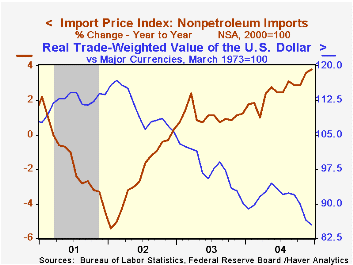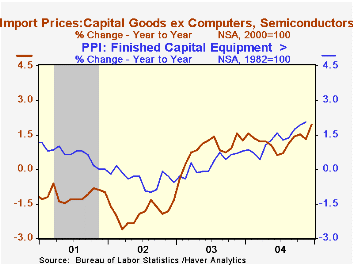 Global| Jan 13 2005
Global| Jan 13 2005Import Prices Lower With Petroleum, Non Oil Prices Firm
by:Tom Moeller
|in:Economy in Brief
Summary
Import prices fell 1.3% last month due to sharply lower prices for petroleum. The Consensus expectation had been for a 0.4% decline. Nonpetroleum prices, however, rose 0.5% and raised the y/y increase to 3.8%, its highest since 1995. [...]

Import prices fell 1.3% last month due to sharply lower prices for petroleum. The Consensus expectation had been for a 0.4% decline. Nonpetroleum prices, however, rose 0.5% and raised the y/y increase to 3.8%, its highest since 1995.
During the last ten years there has been a (negative) 55% correlation between the level of the dollar and the y/y change in nonpetroleum import prices.
Import pricing strength in December was most pronounced for foods, feeds & beverages which rose 1.0% (7.8% y/y). Gains elsewhere were more moderate, but up moderately from earlier lows. 
Capital goods prices rose 0.3% and the y/y change rose to -0.9% versus earlier 2% to 8% rates of decline. Excluding computers capital goods prices rose 0.5% and the y/y gain of 1.9% compared to price deflation of 1.9% in 2002 and of 4.2% during 1997. Non-auto consumer goods import prices rose 0.3% and the y/y change rose to 0.7% versus a peak rate of decline of 1.6% in early 2002.
Petroleum prices fell 1.5% as the price of Brent crude oil fell to $39.12 in December. It rose to $43.16 last week.
Export prices rose 0.2%. Nonagricultural export prices rose 0.1% (4.9% y/y).
| Import/Export Prices (NSA) | Dec | Nov | Y/Y | 2004 | 2003 | 2002 |
|---|---|---|---|---|---|---|
| Import - All Commodities | -1.3% | -0.2% | 6.9% | 5.7% | 2.9% | -2.5% |
| Petroleum | -11.5% | -5.7% | 30.8% | 30.6% | 21.0% | 3.0% |
| Non-petroleum | 0.5% | 0.9% | 3.8% | 2.6% | 1.1% | -2.4% |
| Export - All Commodities | 0.2% | 0.3% | 4.1% | 3.9% | 1.6% | -1.0% |
Tom Moeller
AuthorMore in Author Profile »Prior to joining Haver Analytics in 2000, Mr. Moeller worked as the Economist at Chancellor Capital Management from 1985 to 1999. There, he developed comprehensive economic forecasts and interpreted economic data for equity and fixed income portfolio managers. Also at Chancellor, Mr. Moeller worked as an equity analyst and was responsible for researching and rating companies in the economically sensitive automobile and housing industries for investment in Chancellor’s equity portfolio. Prior to joining Chancellor, Mr. Moeller was an Economist at Citibank from 1979 to 1984. He also analyzed pricing behavior in the metals industry for the Council on Wage and Price Stability in Washington, D.C. In 1999, Mr. Moeller received the award for most accurate forecast from the Forecasters' Club of New York. From 1990 to 1992 he was President of the New York Association for Business Economists. Mr. Moeller earned an M.B.A. in Finance from Fordham University, where he graduated in 1987. He holds a Bachelor of Arts in Economics from George Washington University.
More Economy in Brief
 Global| Feb 05 2026
Global| Feb 05 2026Charts of the Week: Balanced Policy, Resilient Data and AI Narratives
by:Andrew Cates






